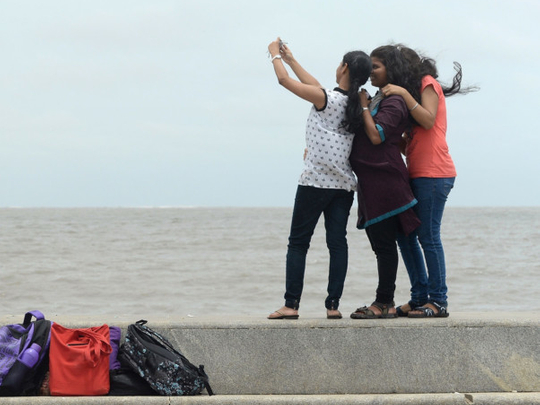
New Delhi: Taking selfies and uploading them to social media might be the in trend globally, but if the latest statistics are anything to go by, there have been several instances in the last year when people posing for selfies have died after overlooking grave risks while caught up in the moment.
Instances of people taking selfies in front of an oncoming train, in a rickety boat, or posing on the top of a fort or by the beach in the midst of high tide, continue to prove tragic.
Raising an alarm over the issue, a recent report on such deaths around the world and published in Washington Post, said that out of at least 27 “selfie-related deaths” around the world last year, about half occurred in India. No separate statistics are made available by the central and state governments in India indicating the number of ‘selfie deaths’ in the country.
Caught in the act: How does a bear in the backdrop make for a photo opportunity?
Recently, in the wake of a drowning in Mumbai which took place when three girls were clicking selfies, the Mumbai police have begun a process of identifying spots, mostly near beaches and forts in the city, to ban selfies.
Mumbai Deputy Commissioner of Police Dhananjay Kulkarni told Gulf News: “We have initiated the process of identifying and marking certain spots in the city as ‘no selfie zones’ in a bid to discourage people from putting themselves at risk while photographing themselves.”
On January 17, two youngsters drowned in the Narmada river in Madhya Pradesh while trying to take a selfie. The two – identified as cousins Amit, 20, and Kamal, 18 – drowned in the river at Omkareshwar, about 270 km from Bhopal, during a picnic. Police said that Kamal had slipped into the river while trying to take a selfie. Amit jumped into the river to save his cousin but both were swept away by the strong currents.
Last December 6 an 18-year-old youth, Jayesh, died after being hit by a train while he was trying to take a selfie on the tracks. In November, a 14-year old schoolboy, who was trying to take a selfie on his cellphone atop a stationary train wagon, was electrocuted in Mumbai. A selfie attempt also turned fatal for a tourist to the Mehrangarh Fort in Rajasthan’s Jodhpur city this month. Nikhil, 23, was trying to click a selfie when he fell from the ramparts of the fort.
Peer pressure
Trying to take a selfie atop a fort proved fatal for a youth in Kashmir also as he fell from there and died in Reasi district. The deceased, identified as Abhishek Gupta, had climbed to the top of the fort to take a selfie. Suddenly, he slipped and fell on a boulder resulting in head injuries. He was rushed to the district hospital in Reasi where doctors declared him dead.
Freeze frame: Yes, that might just be a fake. But it still made us all cringe!
Similarly, a Japanese tourist had also died at the Taj Mahal recently after falling off the steps of the monument while attempting a selfie.
Dr Vaibhav Dubey, psychiatrist at the People’s Hospital in Bhopal, says: “Youngsters are increasingly trying to find their self-esteem and self-worth in the likes and comments they get on their selfies posted on various social media platforms such as Facebook, Twitter etc. Taking precautions while taking selfies can be beneficial in order to ensure more informed and responsible decisions associated with social learning.”
Dr Samir Parikh, Director, Mental Health and Behavioural Science Department, Fortis Hospital, Delhi, says: “One must not succumb to peer pressure. We all are familiar with the craze of selfies, especially among youngsters. But if someone is taking a selfie in a dangerous situation like on a mountain or in the middle of the road, it can lead to fatal accidents. Be smart enough to draw the line as at the end of the day, it is just a picture.”
Behavioural expert Dr Ravi Batra believes that parents must intervene as it is no longer a laughing matter.
“The selfie crazy children may require expert help. There have been cases where youngsters have put themselves at unnecessary risk to take that one good picture. It is crucial that you draw a line between habit and obsessive behaviour,” says Dr Batra.












